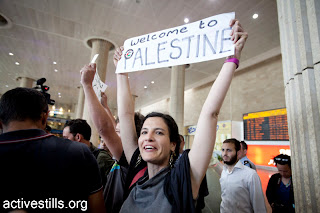By Miri
At least since 09/11 boarding an airplane became a pretty lengthy procedure. Boarding an airplane in order to enter or leave Israel, especially (but not only) as a foreigner and even worse as an Arab or Muslim, has always been a “special” experience. Israeli airline security is notorious for being one of the toughest of all, and in some airports, flights going out to Israel even have a separate terminal.
 |
| Israeli activists welcoming the Flytilla at Ben Gurion Airport, Photo ActiveStills |
Lately, with the “Welcome to Palestine” initiative, during which a total number of 1,200 international activists intended to enter Israel through Ben Gurion Airport and openly voice their intention “to visit Palestine”, the policies regarding entry into Israel have gotten under increased scrutiny and criticism. 600 out of the 1,200 Flytilla activists had reportedly received notifications from their airlines that their flights were canceled.
On a similar account a Swedish woman, trying to get into Israel through the Taba crossing from Egypt, was refused entry unless she signed a document committing herself to “avoid contact with members of any pro Palestinian organization” and to “not participate in any pro Palestinian activities”.
But it is not just people who openly state an intention to visit Palestine, or who engage in what Israeli authorities consider actions that deligitimise Israel, or that constitute a threat to Israel’s security, who are being subjected to these kind of procedures.
One day after the Flytilla event, the Israeli newspaper Haaretz revealed that 40% of those passengers that were blacklisted by the Shin Bet (Israel’s internal security) beforehand, were actually added to those lists without any information regarding their connection to any pro-Palestinian protest activity. Admitting the mistake, officials of Israel’s Foreign Ministry were quoted as saying that “direct damage” had been done “to tourism and to Israel’s good name”.
This shows that the Shin Bet is by far not as knowledgeable as it tries to appear, and also how arbitrary border security can be.
 |
| You may want to consider changing outfit before entering Israel… |
Certain attributes or characteristics of visitors to Israel are considered to be suspicious to the security personnel and may prompt them to target you for further investigations before you even open your mouth. These attributes include Arabic or Muslim origin or appearance, including names, previous visits to countries considered to be enemy states, certain types of clothing that are associated with radical leftist political mindsets, i.e. punks, anarchists and the like, as well as people, specifically men, of certain age groups (from 19 towards mid 30s) travelling alone.
The next step is constituted by the question about the intention of your visit to Israel. Although not an official policy, stating that you cooperate with political pro-Palestinian organisations or individuals, will definitely get you into trouble, and is therefore not recommendable. Saying that you are planning to visit the occupied territories is likely to raise suspicions, but you may pass as an interested, but harmless tourist. However, as the above mentioned example shows, there is no guarantee for anything, so even if you say that you are a dedicated Christian intending to visit the holy sites in Israel, you may be subjected to “a special treatment”.
 This special treatment ranges from simply being put on hold for a while, to undergoing lengthy interrogations, or, in the worst case, enduring a strip search. Hence, being singled out by security personnel doesn’t necessarily mean much. If you are being invited for a “chat” with security personnel, keep in mind that their main strategy in order to figure out the “real” motives behind your visit is by looking for inconsistencies in your story and/or agitating you into panic. You will therefore probably be questioned by different agents who will repeat the same questions over and over again, waiting for you to make mistakes, so the best you can do is to keep calm and stick to your original story.
This special treatment ranges from simply being put on hold for a while, to undergoing lengthy interrogations, or, in the worst case, enduring a strip search. Hence, being singled out by security personnel doesn’t necessarily mean much. If you are being invited for a “chat” with security personnel, keep in mind that their main strategy in order to figure out the “real” motives behind your visit is by looking for inconsistencies in your story and/or agitating you into panic. You will therefore probably be questioned by different agents who will repeat the same questions over and over again, waiting for you to make mistakes, so the best you can do is to keep calm and stick to your original story.Taken that you are a harmless tourist and that the authorities do not have any previous records or information on you, you should be fine.
Bon Voyage!

Comment (0)